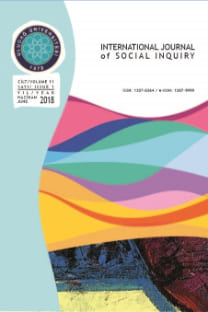Prestige Concept Reconsidered: Hybridity of Prestige in Post-Socialist Biomedical Profession
Prestige Concept Reconsidered: Hybridity of Prestige in Post-Socialist Biomedical Profession
This article re-considers the applicability of the concept of prestige by focusing on a post-socialist context as the site of particularly rapid social change and re-negotiation of social relationships. I argue against the assumption that the biomedical profession in post-socialist societies is not prestigious. My ethnographic data suggest that the search for the economic capital reflects not only desire of physical comfort, but just as importantly, desire for re-negotiated social status in the context where relationships between social classes change. The concept of prestige emerges as a nuanced process rather than static notion, underlying the multiple factors influencing post-socialist physicians’ status.
Keywords:
Prestige, social capital, hybridity, biomedical profession post-socialism,
___
- Barkow, J. H., A. A. Akiwowo, et al. (1975). "Prestige and Culture: A Biosocial Interpretation [and Comments and Replies]." Current Anthropology 16(4): 553-572.
- Bourdieu, P. (1984). Distinction: a social critique of the judgement of taste. Cambridge, Mass., Harvard University Press.
- Bourdieu, P. and L. J. D. Wacquant (1992). An invitation to reflexive sociology. Chicago, University of Chicago Press.
- Buyandelgeriyn, M. (2008). "Post-Post-Transition Theories: Walking on Multiple Paths." Annual Review of Anthropology 37: 235-266.
- Caldwell, M. L. (2004). "Not by bread alone social support in the new Russia."
- DerzhKomStat (2009). Sredniaya zarplata ukraintsev: obzor po otrasliam. (Average salary of Ukrainians: overview across industries). S. S. Committee.
- Dumont, L. (1970). Homo hierarchicus: the caste system and its implications. London, Weidenfeld & Nicolson.
- Field, M. G. (1988). "The position of the Soviet physician: the bureaucratic professional." The Milbank quarterly 66: 182-201.
- Ghodsee, K. (2005). The Red Riviera. Gender, Tourism, and Postsocialism on the Black Sea., Duke University Press. Durham and London. .
- Goldman, H. (1988). Max Weber and Thomas Mann : calling and the shaping of the self. Berkeley, University of California Press.
- Goode, W. J. (1978). The celebration of heroes : prestige as a social control system. Berkeley, University of California Press.
- Groedeland, A. B., T. Y. Koshechkina, et al. (1998). "F`oolish to Give and Yet More Foolish Not to Take' - In-depth Interviews with Post-Communist Citizens on Their Everyday Use of Bribes and Contacts." Europe Asia Studies 50(4): 651-678.
- Hafferty, F. W. and J. B. McKinlay (1993). The Changing medical profession : an international perspective. New York, Oxford University Press.
- Harden, J. (2001). "“Mother Russia” at Work. Gender Divisions in the Medical Profession. ." European Journal of Women’s Studies 8(2): 181-199.
- Hatch, E. (1989). "Theories of Social Honor." American Anthropologist 91(2): 341-353.
- Huizinga, J. (1955). Homo ludens; a study of the play-element in culture. Boston, Beacon Press.
- Kriachkova, L. V., Hubar, I. O., Maksymenko, O. P., Borvinko E. V. (2006) Analiz Mozhlyvostey Naselennia shchodo Vykorystaniia Pryvatnyh Medychnyh Poslug (Population Analysis of Private Health Care Consumption Potential). Dnipropetrovs’k National Medical Academy
- Leach, E. R. (1965). Political systems of Highland Burma: a study of Kachin social structure. Boston, Beacon Press.
- Ledeneva, A. V. (1998). Russia's economy of favours : blat, networking, and informal exchange. Cambridge, UK; New York, NY, USA, Cambridge University Press.
- Lorber, J. (1993). Why Women Physicians Will Never be True Equals in the American Medical Profession. Gender, Work and Medicine. E. R. a. K. Wegar, SAGE.
- Malinowski, B. (1926). Crime and custom in savage society. London; New York, K. Paul, Trench, Trubner & Co.; Harcourt, Brace & Co.
- Marciniak, K. (2009). "Post-Socialist Hybrids." Euroepan Journal of Cultural Studies 12: 190.
- Navarro, V. (1977). Social security and medicine in the USSR a marxist critique. Lexington, Mass. [u.a., Heath.
- Patico, J. (2005). "To Be Happy in Mercedes: Tropes of Value and Ambivalent Visions of Marketization. ." American Ethnologist 32(3): 479-496.
- Patico, J. (2008). Consumption and social change in a post-Soviet middle class. Washington, D.C.; Stanford, Calif., Woodrow Wilson Center Press ; Stanford University Press.
- Polischuk, M. (2006). Okhorona Zdorov’ia v Ukraiyni: Vyklyky Transformatsiyi Systemy. (Health Care in Ukraine: Challenges of System Transformation).
- Radhakrishnan, S. (2009). "Professional Women, Good Families: Respectable Femininity and the Cultural Politics of a "New" India." Qualitative Sociology 32(2): 195- 212
- Riska, E. (2001). Medical Careers and Feminist Agendas. American, Scandinavian and Russian Women Physicians., Aldine De Gruyter.
- Rivkin-Fish, M. (2005). Women's Health in Post-Soviet Russia: The Politics of Intervention., Indiana University Press.
- Schecter, K. (1992). "Soviet socialized medicine and the right to health care in a changing Soviet Union."Human rights quarterly. - 142: 206-215.
- Steinberg, M. D. and C. Wanner (2008). Religion, morality, and community in post-Soviet societies. Washington, D.C.; Bloomington, Woodrow Wilson Center Press; Indiana University Press.
- Thompson, R. and S. Witter (2000). "Informal payments in transitional economies: implications for health sector reform."The International journal of health planning and management 15(3).
- Turner, J. H. (1984). Societal stratification: a theoretical analysis. New York, Columbia University Press.
- Veblen, T. (1973). The theory of the leisure class. With an introd. by John Kenneth Galbraith. Boston, Houghton Mifflin.
- Wanner, C. (2007). Communities of the converted: Ukrainians and global evangelism. Ithaca, Cornell University Press.
- Zigon, J. (2008). Morality: an anthropological perspective. Oxford; New York, Berg.
- ISSN: 1307-8364
- Yayın Aralığı: Yılda 2 Sayı
- Başlangıç: 2008
- Yayıncı: BURSA ULUDAĞ ÜNİVERSİTESİ > SOSYAL BİLİMLER ENSTİTÜSÜ
Sayıdaki Diğer Makaleler
The Capital Use of Social Capital or How Social Capital is Used to Keep Capital Concentrated
Anthony P. GLASCOCK, David M. KUTZIK
Primary School Students’ Benefiting From Museums With Educational Purposes
Building Social Capital and Education: The Experiences of Pakistani Muslims in the UK
Suruchi THAPAR, Gurchathen SANGHERA
Class to Class: Working Views Out of the Factory
Social Capital Dimensions in Collaborative Networks: The Role of Linking Social Capital
Janaina MACKE, Eliete Kunrath DILLY
Prestige Concept Reconsidered: Hybridity of Prestige in Post-Socialist Biomedical Profession
